Read "DTC Status" parameter
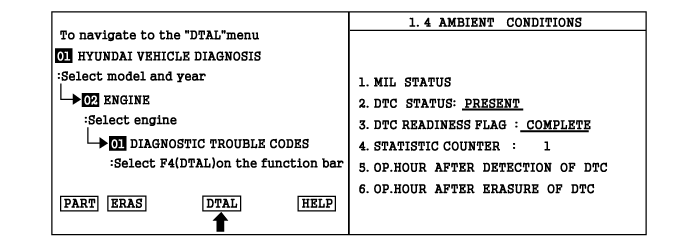

The Intake Air Temperature Sensor (IATS) is installed into the Mass Air Flow Sensor (MAFS). The IATS uses a thermistor whose resistance changes with the temperature. The electrical resistance of the IATS decreases as the temperature increases, and increases as the temperature decreases. The 5 V power source in the ECM is supplied to the IATS via a resistor in the ECM. That is, the resistor in the ECM and the thermistor in the IATS are connected in series. When the resistance value of the thermistor in IATS changes according to the intake air temperature, the signal voltage also changes. Using this signal, the information of the intake air temperature, the ECM corrects basic fuel injection duration and ignition timing.
ECM sets DTC P0113 if the ECM detects signal voltage higher than the possible range of a properly operating IATS.
Item | Detecting Condition | Possible Cause |
DTC Strategy | ● Voltage range check | ● Short to battery in signal harness ● Open in signal or ground circuit ● Contact resistance in connections ● Faulty IAT sensor |
Enable Conditions | ● 6 < Battery voltage ● Time after start > 110 sec. | |
Threshold Value | ● Measured intake air temperature < -46℃(-51℉) | |
Diagnostic Time | ● 5 seconds | |
Fail-Safe | ● No failure detected on ECTS - The limp home value of IATS depends on engine coolant temperature. ● Failure detected on ECTS - PCM controls with mapping data. | |
Mil On Condition | ● 2 Driving Cycles |
Temp.(°C) | Temp.(°F) | Resistance(kΩ) | Temp.(°C) | Temp.(°F) | Resistance(kΩ) |
-10 | 14 | 8.5~9.7 | 20 | 68 | 2.3~2.5 |
0 | 32 | 5.4~6.1 | 30 | 86 | 1.6~1.7 |
10 | 50 | 3.5~3.9 | 80 | 176 | Approx. 0.3 |
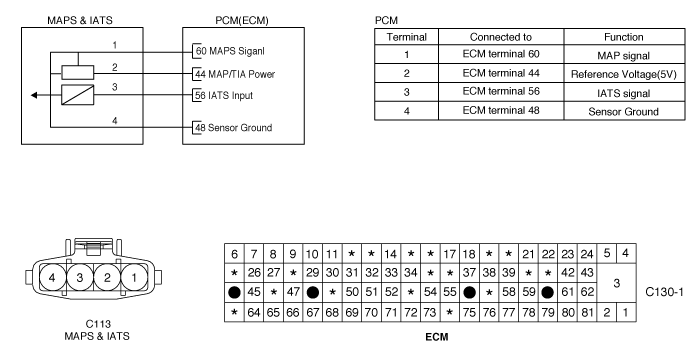
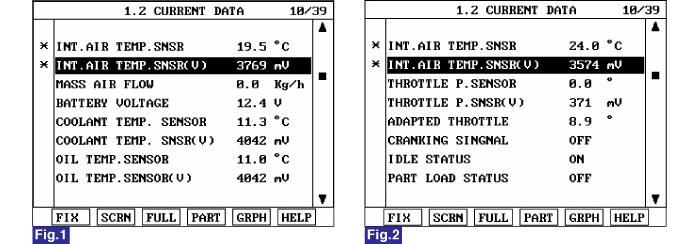
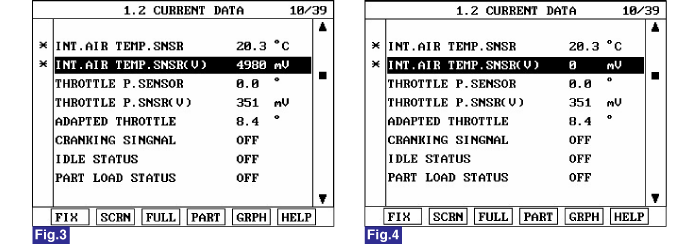
Fig 1,2) Signal decreases with increasing sensor temperature and increases with decreasing sensor temperature : Approx. 3769mV at 19.5℃(at IG ON), Approx. 3574mV at 24.0℃(at Idle)
Fig 3) Open or short to battery in signal circuit/Open in ground circuit : Approx. 5V
Fig 4) Short to ground in signal circuit : Approx. 0V
Connect scan tool and select "Diagnostic Trouble Codes(DTCs)" mode.
Press F4(DTAL) to select DTC information from the DTCs menu.
Confirm that "DTC Readiness Flag" indicates "Complete". If not, drive the vehicle within conditions noted in the freeze frame data or enable conditions.
Read "DTC Status" parameter

Is parameter displayed "History(Not Present) fault"?
History (Not Present) fault : DTC occurred but has been cleared.
Present fault : DTC is occurring at present time.
 | ▶ Fault is intermittent caused by poor contact in the sensor's and/or ECM's connector or was repaired and ECM memory was not cleared. Thoroughly check connectors for looseness, poor connection, bending, corrosion, contamination, deterioration, or damage. Repair or replace as necessary and then go to "Verification of Vehicle Repair" procedure. |
 | ▶ Go to next step as below |
Ignition "OFF".
Disconnect IATS connector.
Measure resistance between terminals 4 of the sensor harness connector and chassis ground.
Specification : Approx. 0Ω
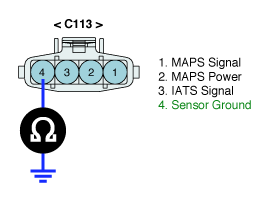
Is resistance within the specification?
 | ▶ Go to next step as below. |
 | ▶ Repair open circuit and go to "Verification of Vehicle Repair" procedure. |
Ignition "ON" & Engine "OFF"
Measure voltage between terminals 3 of the sensor harness connector and chassis ground.
Specification : Approx. 5V
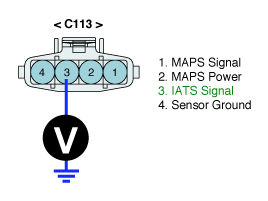
Is voltage within the specification?
 | ▶ Go to next step as below |
 | ▶ Check for open or short to battery in signal harness. Repair as necessary and go to "Verification of Vehicle Repair" procedure. |
Many malfunctions in the electrical system are caused by poor harness(es) and terminals. Faults can also be caused by interference from other electrical systems, and mechanical or chemical damage.
Thoroughly check connectors for looseness, poor connection, bending, corrosion, contamination, deterioration, or damage.
Has a problem been found?
 | ▶ Repair as necessary and go to "Verification of Vehicle Repair" procedure. |
 | ▶ Go to next step as below |
Ignition "OFF"
Measure resistance between terminals 3 and 4 of the sensor connector(Component side).
Temp.(°C) | Temp.(°F) | Resistance(kΩ) | Temp.(°C) | Temp.(°F) | Resistance(kΩ) |
-10 | 14 | 8.5~9.7 | 20 | 68 | 2.3~2.5 |
0 | 32 | 5.4~6.1 | 30 | 86 | 1.6~1.7 |
10 | 50 | 3.5~3.9 | 80 | 176 | Approx. 0.3 |
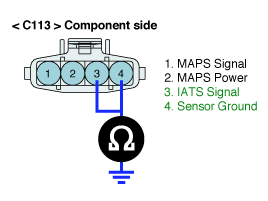
Is resistance within the specification?
 | ▶ Check for poor connection between ECM and component: backed out terminal, improper mating, broken locks or poor terminal to wire connection. Repair as necessary and go to "Verification of Vehicle Repair" procedure. |
 | ▶ Check IATS for contamination, deterioration, or damage. Substitute with a known-good IATS and check for proper operation. If the problem is corrected, replace IATS and then go to "Verification of Vehicle Repair" procedure. |
After a repair, it is essential to verify that the fault has been corrected.
Connect scan tool and select "Diagnostic Trouble Codes(DTCs)" mode
Press F4(DTAL) and confirm that "DTC Readiness Flag" indicates "Complete". If not, drive the vehicle within conditions noted in the freeze frame data or enable conditions
Read "DTC Status" parameter
Is parameter displayed "History(Not Present) fault"?
 | ▶ System performing to specification at this time. Clear the DTC |
 | ▶ Go to the applicable troubleshooting procedure. |